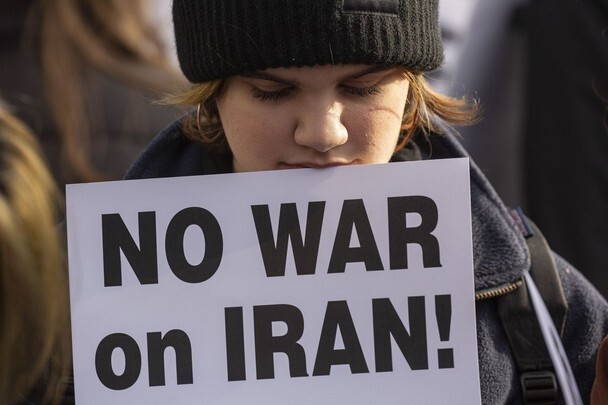hankyoreh
Links to other country sites 다른 나라 사이트 링크
[Editorial] US, Iran seriously need to de-escalate their conflict

After the US military launched a surgical drone strike that killed Qasem Soleimani, a leading figure in the Iranian military and head of the Quds Force, part of the Revolutionary Guard, concerns about a head-on collision between the two countries are rapidly growing. Iran’s repeated vows of vengeance have prompted the US to send more troops to the Persian Gulf. There are serious concerns that the abrupt rise in tensions between the two countries will further destabilize the Middle East, already a turbulent region. The UN and other segments of the international community are strongly calling for restraint from action that would aggravate tensions. We hope that the two countries will heed these calls and act with prudence.
On Jan. 4, Iran began a massive funeral for Soleimani slated to last for four days. Rallies have been held in Tehran and other cities in Iran to mourn the general’s death and to condemn the US. Iranian President Hassan Rouhani promised the general’s bereaved family on Jan. 4 that the people of Iran would revenge their loss, a promise that appears to reflect this mood. The US is also rushing to deploy 3,500 more soldiers to the region, to respond to any Iranian counterattack. The standoff between the two countries is growing more volatile, with US President Donald Trump declaring that the US is prepared to strike 52 Iranian sites if Iran retaliates.
The immediate cause of this crisis was the death of an American civilian contractor in a rocket attack on an American military base in Iraq at the end of last year. When the US retaliated by launching an airstrike on a pro-Iranian militia that it blamed for the attack, pro-Iranian demonstrators stormed the American embassy in Baghdad. Pinning these actions on Soleimani, the US military took swift action to eliminate him.
But the background of these developments is the deep-rooted mistrust and conflict between the two countries. After the Trump administration unilaterally pulled out of a nuclear deal with Iran in 2018 and reinstated full sanctions, tensions have risen, leading the US to ask its allies to deploy troops to the Strait of Hormuz. Such hostile relations have basically reached the boiling point.
Trump explained that Soleimani was killed because he had been planning a cruel and imminent attack on Americans. But it’s doubtful whether the unauthorized slaying of a public figure of a sovereign state by military force in a third-party country can be justified as an act of self-defense. The US should show some humility about accusations that this air strike violated international law. Iran should also tread carefully, since a hasty retaliation would only provoke another counterattack by the US, ultimately placing the region in further danger.
The South Korean government needs to prepare for the possibility of escalation in the conflict between the US and Iran. It should also seriously review a plan to deploy forces to the Strait of Hormuz at the US request. If South Korea finds itself trapped in an armed clash between the two countries, there could be unintended casualties. There’s a growing need to take safety measures, such as evacuating the 1,600 Koreans in Iraq. The government also needs to thoroughly review the potential economic consequences of a crisis in the Middle East, including a spike in oil prices and an interruption in the oil supply.
Please direct comments or questions to [english@hani.co.kr]

Editorial・opinion
![[Column] The state is back — but is it in business? [Column] The state is back — but is it in business?](https://flexible.img.hani.co.kr/flexible/normal/500/300/imgdb/original/2024/0506/8217149564092725.jpg) [Column] The state is back — but is it in business?
[Column] The state is back — but is it in business?![[Column] Life on our Trisolaris [Column] Life on our Trisolaris](https://flexible.img.hani.co.kr/flexible/normal/500/300/imgdb/original/2024/0505/4817148682278544.jpg) [Column] Life on our Trisolaris
[Column] Life on our Trisolaris- [Editorial] Penalties for airing allegations against Korea’s first lady endanger free press
- [Editorial] Yoon must halt procurement of SM-3 interceptor missiles
- [Guest essay] Maybe Korea’s rapid population decline is an opportunity, not a crisis
- [Column] Can Yoon steer diplomacy with Russia, China back on track?
- [Column] Season 2 of special prosecutor probe may be coming to Korea soon
- [Column] Park Geun-hye déjà vu in Yoon Suk-yeol
- [Editorial] New weight of N. Korea’s nuclear threats makes dialogue all the more urgent
- [Guest essay] The real reason Korea’s new right wants to dub Rhee a founding father
Most viewed articles
- 1[Column] Why Korea’s hard right is fated to lose
- 2Amid US-China clash, Korea must remember its failures in the 19th century, advises scholar
- 360% of young Koreans see no need to have kids after marriage
- 4[Column] The state is back — but is it in business?
- 5[Column] Can Yoon steer diplomacy with Russia, China back on track?
- 6[Editorial] Stagnant youth employment poses serious issues for Korea’s future
- 7Hybe-Ador dispute shines light on pervasive issues behind K-pop’s tidy facade
- 8Inside the law for a special counsel probe over a Korean Marine’s death
- 9Japan says it’s not pressuring Naver to sell Line, but Korean insiders say otherwise
- 10USFK sprayed defoliant from 1955 to 1995, new testimony suggests